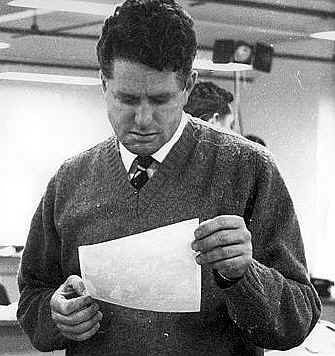
Maxwell Newton. After the Sunday Observer. Part 2

After his publishing empire had collapsed in the mid-1970s, Observer publisher Maxwell Newton moved to America and restored his career.
Maxwell Newton was described by Jim Grant, is his Grant’s Interest Rate Observer (Oct. 22, 1984): “By 1977, his net worth was $3 million or so at the top. He was re-building his fortunes in pornographic books and sexual paraphernalia.
“Smut was the next logical step, Max relates, because he’d been printing dirty magazines in order to spread the costs of his printing operations over a wider base.
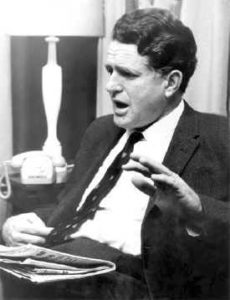
“It was [Rupert] Murdoch who helped him back into journalism, Max says, first, by refusing to print his ads for ‘sexy grab bags’ in the Murdoch newspapers (a crippling blow to Max’s marital aids business) and then subsequently by publishing his articles in The Australian and by bringing him to the New York Post.”
Current day Melbourne Observer Editor Ash Long takes up the story: “On the weekend before Easter 1985, the company I was working for at the time (Victorian Media Corporation) was drastically in need of an injection of funds. A chance call to Newton, in Connecticut, saw me on board a Qantas 747 within 24 hours to see if those funds could be obtained through Newton’s help.
“So to New York in 26 hours flat, and a train ride from New York Central, hundreds of feet under the giant Pan Am building crossing 44th Street. Newton was waiting for me at the end of an hour’s ride of the hourly Stamford commuter train to Drayton in Connecticut. Snow-cold Drayton saw an auburn-going-white-haired Newton meet me in his small two-door Ford Escort. His wife, vivacious red-haired Olivia, greeted me and introduced herself as ‘Mrs Newton The Third’.
“First, we travelled to the local Ford-Mercury-Lincoln dealer, where Max and I moved across to his newly-serviced Lincoln, for which Olivia had told Max had done some deal. Max borrowed $10 from me to fill up with unleaded gas, and we were on our way. Newton had pride in showing me houses he had purchased on his earnings, included in which was a $150,000 annual salary from the New York Post.”
“Max prided that he was flying out son Antony with wife Mary and their two boys. Antony had worked Max in distributing his Canberra Post giveaway newspaper, and had farmed at Berrima in New South Wales. Max said that he had left Australia on November 14, 1978, with Olivia – and $5.
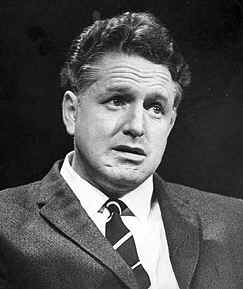
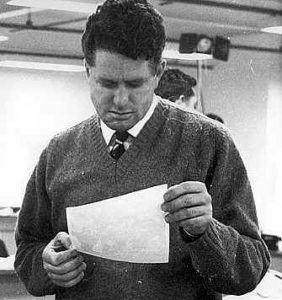
“Now he had four homes, including his own $½-million property in Wilton – the most affluent county in America. He said he was now financially secure and had again hit the big-time professionally.
“The Fed – a book he had published was featured in The New York Times Books – had sold well with 130,000 copies. He was doing well on the lecture circuit including work with Lockheed in Los Angeles, Zurich, New York, London and in the Bahamas.”
Ash Long continues: “As we drove, Max had to take ‘piss-stops’, which he said, were caused by his diabetes. He took a capsule which he said was ‘lithium nitrate’, a metal which he said took away depression and fear. He told of his days since as a member of Alcoholics Anonymous, and that he had recognised God.
“We lunched at Harpers, a local restaurant, where I confused the Americans by asking for a gin squash. Newton was satisfied with a tomato juice. We discussed possible financing for my Australian company including names of brokers, contacts at banks, and other possible sources fo dragging us out of trouble.
“Newton recalled how he had obtained funds from Marrickville Holdings, from doctors, and from a finance broker in Melbourne.”
“Back at his home, Newton’s home included facsimile, four computers with ‘Wordstar’ programming and facilities for electronic mail-boxes for subscribers to his various news services through ‘MaxNews’.
“Newton said he was contributing not only to the The New York Post, but also three columns weekly for the Sydney Daily Mirror, and one each for the Daily Telegraph and The Australian, as well as The Times in London.
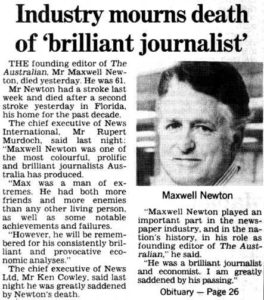
“We recalled his days of his home at 607 Toorak Road (‘Towart Lodge’), funded by Eastern Suburbs Permanent Building Society cash. Max laughed about losing the contact to print the Church of England newspaper at Regal Press because publishing hands used spoils of pornogaphic newspaper to bundle the religious papers.
“Max turned his mind to Australia. That previous weekend he had revealed making undercover payments of cash to a Premier (Robert Askin of NSW), and he had been interviewed on Good Morning Australia, and Terry Willesee’s TV program. Former Sunday Observer producer John Brook was producer at GMA.
Ash Long continues: “The last contact that I had was a return Christmas message in early 1986 with Olivia writing that Max was slowly recovering from a stroke.
Max Newton died on July 23, 1990, at the age of 61. We gathered at St John’s, Toorak, for a Thanksgiving Service on July 27. Speakers included Alan Armsden and Jim Marrett, who had worked for Max at the Sunday Observer.
A few years after Newton’s passing, his daughter Sarah penned Maxwell Newton — a Biography (Fremantle Arts Centre Press). Newton’s former employee, Richard Farmer, wrote: “It was a measure of the strange mixture that was Max Newton that he could not be gracious in victory. For years he led the public fight against tariff protection in Australia. Yet when his schoolmate Bob Hawke presided over the victory Max had fought so long for, Max could not find a good word to say. His disrespect for the schoolyard wimp he remembered from his youth overwhelmed his judgment of the Prime Minister who had made the courageous de cision. Max Newton was churlish about Bob Hawke to the last. Not even Hawke’s lowering of all protection to negligible levels could overcome his dislike of the boy at Perth Modern School that he and John Stone had teased remorselessly. Max did not like Hawke in his youth and he did not like him when he died and nothing Hawke said or did between times would have changed the judgment. Without the shadow of a doubt, there was a touch of jealousy in the way Newton reacted to Hawke and many of the other public figures he wrote about during his 35 years in journalism.
“Max always thought he was cleverer than the mere mortals who ran the country or the companies he observed and perhaps, for much of the time, he was. With the exception of Sir Frederick Wheeler, he was certainly the brightest, most inspiring and most infuriating man I have worked for. What I had not realised until I read the recently published biography of him written by his daughter Sarah was the extent to which the infuriating Max Newton was a victim of a severe mental disorder. Max Newton was a manic depressive and his father before him appears, from Sarah’s description, to have been the same. Yet in the years when I was privileged to share his life, this mental con dition was virtually unknown.
“Living next door to the Newton family and working with the great man in the mid-1960s, I was as aware as the little girl Sarah of Max’s moods but had no idea what caused them. Today, hopefully, things would be different and unknowing GPs would not pack a patient off with the packets of Mandrax which, combined with alcohol, caused some of the worst of Max’s excesses. It is the frank way in which the daughter has written about her
father’s mental condition which makes Maxwell Newton — a Biography such an unusual and interesting book. This is a warts and-all account of a life as Sarah Newton embarked on her tour of discovery of her father who was “among other things, an extraordinarily gifted economist, a newspaper editor, a scholar, a highly respected financial master mind … a political agitator and undercover operator… a brothel owner…, a husband three times
over, a father of six, a grandfather of five, an alcoholic and drug addict … a showman extraordinaire, an emotional weakling, yet a man of enormous courage, and one of the most generous human beings to bless the earth”.
Richard Farmer’s piece in The Canberra Times (September 17, 1993), continued: “I say unusual because in this book Sarah Newton has not set out to find herself by vilifying her father. There is an understanding here of the human condition of which dad would have been proud. The story of the brothel owner and pornography publisher is recounted in such a way that we can make our own assessment of the sadness of a fine mind that went
wrong. Max would have been proud as well of the readable nature of his daughter’s account of his life. He strove as a journalist to write about complex things in an understandable way and Sarah has managed to do the same. Not that this should be seen as some perfect biography. It is not. It relies too much on reminiscences to be that and from my own frail memory I know that some of those reminiscences are wrong. The incidental mentions of myself, for example, compress my two joinings of the Max Newton staff that were six years apart into one. That is but a minor quibble about a book which I hope elevates a journalist who played a major part in the Australian political debate to the level which he deserves.
“Max Newton, whether madman or not, was the journalist who started to expose the corruption and hypocrisy of our system of government. As the editor of the Financial Review and The Australian and then as the publisher of newsletters he relentlessly pursued the cosy relationships between business and government which resulted in our inefficient manufacturing industry. I just wish Sarah had been able at the end to be more charitable to
the man who finally did what her father had been advocating. Bob Hawke was the man who finally practised what Max Newlon preached.,” Farmer said.
Even after Newton’s death in 1990, his influence continued. The Australian Industrial Relations Commission, hsucceeded in an application in the High Court to challenge the constitutional validity of contempt provisions of the Act. The owner of The Australian, Nationwide News Pty Ltd, was facing a charge under the Act of bringing the commission into disrepute. The charge was over an article by Newton.
